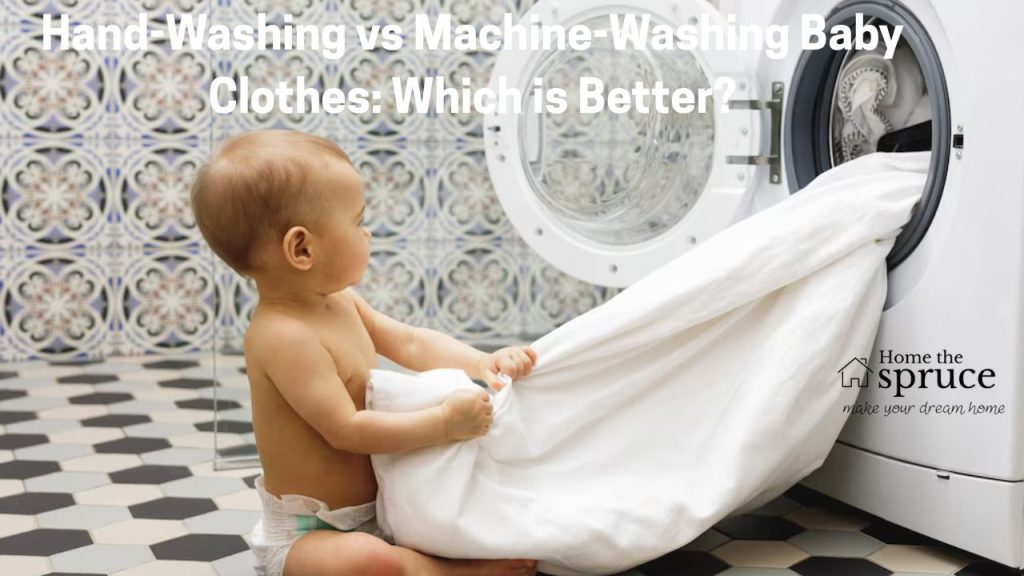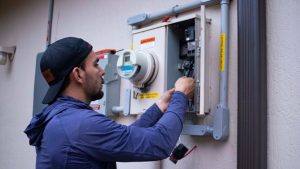Parents will always want to get the most convenient and the best, both clean and safe way to wash their baby’s clothes. So you probably ask yourself, which of hand washing or machine washing leads to a better result, and machine washing does not take longer than hand washing. There are some circumstances that will decide between hand washing and machine washing, and each has its own advantages and disadvantages.

If you’ve already learned how to wash baby clothes, the next step is deciding whether to hand-wash or machine-wash them. This article examines the distinctions between hand washing and machine washing while providing advantages and usage recommendations to help you select the most suitable method.
Why Baby Clothes Need Special Care
Baby skin is incredibly sensitive. Residues can be left behind by the wrong washing technique or detergent that irritates the skin. They can also expect rashes or allergic reactions. Softer, if not delicate, fabrics are also used in making baby clothes, which must be handled with care. The handling of this clothing is different than that of adult clothing.
As a result, how you do the laundry of their clothes is more important than you might believe.
Pros and Cons of Hand-Washing Baby Clothes
Pros of Hand-Washing
1. Kinder to Clothes
Hand washing gives you complete control over the amount of pressure used. Fragile garments such as knitted clothing, lace-edged garments, or embellished garments.
2. Ideal for Spot Cleaning
Hand washing is handy when you have only one soiled onesie or bib so that you can eliminate washing the whole load in the machine and concentrate on the stained section.
3. Reduced Chance of Chemical Residue
Hand washing is ideal for babies with oversensitive skin, as you can wash thoroughly and make sure there is no leftover detergent.
Cons of Hand-Washing
1. Time-Consuming
If you have a baby at home, you have no time! Soaking, scrubbing, rinsing, and wringing out all the clothing can soon become too much to handle. If your baby is changing clothes several times a day, this is particularly true.
2. Harder to Sanitize
Hand washing fails to deliver the necessary sanitation level that cloth diapers require due to their heavy soiling. The process of hand washing does not reach temperatures sufficient to eliminate bacteria and germs.
3. Physically Demanding
Hand washing clothes can be physically demanding. The continuous motion used for squeezing and cleaning will put strain on both your wrists and arms. Washing a large laundry load becomes more challenging for the hands and arms.
Pros and Cons of Machine-Washing Baby Clothes
Pros of Machine-Washing
1. Saves Time and Effort
Machine-washing is a lifesaver for busy parents. Machines can clean large laundry loads with just a push of a few buttons.
2. Thorough Cleaning
Modern washing machines offer various cycles (like delicate, sanitize, or baby care) that thoroughly clean clothes while still being gentle.
3. Consistent Results
Machines ensure an even, consistent wash, meaning less risk of missed stains or detergent residue if you set the cycle correctly.
Cons of Machine-Washing
1. Risk of Fabric Damage
Even on a delicate cycle, zippers, snaps, or rough fabrics in a load can snag and damage softer baby clothes unless precautions are taken.
2. Potential for Residue
Despite using a baby-specific detergent, traces can remain in the fabric. This can lead to residue buildup, irritating your baby’s skin.
3. Not Ideal for Ultra-Delicate Items
Some handmade or particularly fragile items may still need hand-washing, as machines (even on gentle cycles) can be too rough.
When Should You Hand-Wash Baby Clothes?
Hand-washing is the better option if:
- The clothes are made from delicate fabrics (lace, wool, silk).
- You are treating heavy stains before a regular wash.
- Your baby has extremely sensitive or allergy-prone skin, and you want full control over rinsing.
- The clothing label recommends hand-washing.
Wash the fibers using lukewarm water along with a mild baby detergent by applying gentle squeezing motions.
When Should You Machine-Wash Baby Clothes?
Machine-washing is the better option if:
- You have large volumes of laundry (which is common with babies!).
- Your washing machine has a baby-specific washing setting.
- The clothes are made from machine-washable fabrics like cotton or polyester.
- You need to sanitize items like cloth diapers, bibs, or heavily soiled clothes.
- You want to save some time.
- You need consistent, thorough cleaning
Be sure to:
- Use a delicate or baby care cycle.
- Select cold or warm water (unless sanitation is needed).
- Choose a detergent that’s free of dyes and perfumes.
- Use a low heat setting for machine drying.
So, Which is Better?
It is safe to say that there is no good or bad method of washing baby clothes. This solution provides gentle washing that suits delicate fabric items. The product suits delicate fabric items because it provides gentle cleaning. The speed of machine washing surpasses both hand washing and all other methods, thus making it the best choice for daily items such as pajamas and bodysuits.
The choice to wash your baby’s clothes depends on their skin sensitivit,y together with fabric type and clothing soiling.
Some Final Thoughts
Washing baby clothes is a great way to start caring for your baby’s clothes. Next, it chooses the right washing method. From tossing a basket full in the machine to hand washing tiny socks, a little extra care guarantees your baby stays comfortable and those precious outfits last a bit longer.








